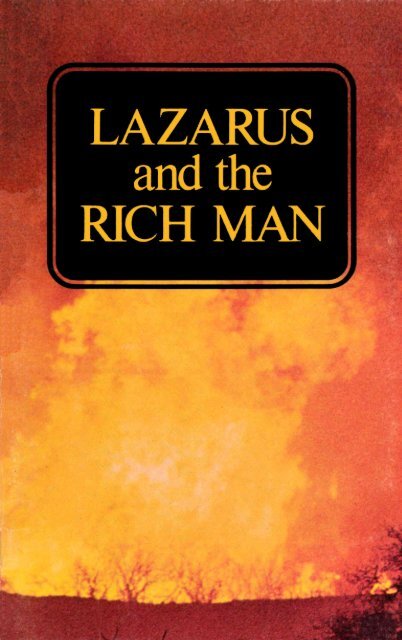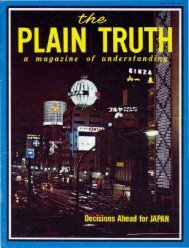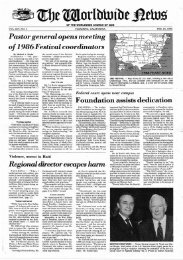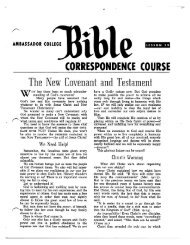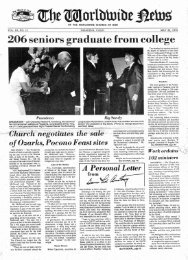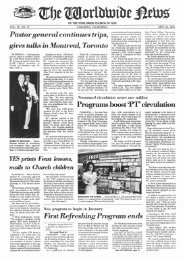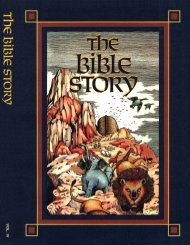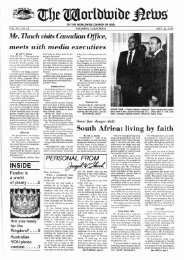Lazarus and the Rich Man (1973)_b.pdf - Herbert W. Armstrong
Lazarus and the Rich Man (1973)_b.pdf - Herbert W. Armstrong
Lazarus and the Rich Man (1973)_b.pdf - Herbert W. Armstrong
Create successful ePaper yourself
Turn your PDF publications into a flip-book with our unique Google optimized e-Paper software.
Cover photo: Ambassador College
LAZARUS<br />
<strong>and</strong> <strong>the</strong><br />
RICH<br />
by<br />
HERBERT W. ARMSTRONG<br />
AMBASSADOR COLLEGE PRESS<br />
Pasadena, California
This booklet is not to be sold.<br />
It is a free educational service in <strong>the</strong><br />
public interest, published by <strong>the</strong><br />
Ambassador College Department of<br />
Theology.<br />
© 1953, 1971, <strong>1973</strong> Ambassador College<br />
All Rights Reserved<br />
Printed in <strong>the</strong> United States of America
Thous<strong>and</strong>s have asked<br />
for <strong>the</strong> true explanation<br />
of <strong>the</strong> "rich man<br />
<strong>and</strong> <strong>Lazarus</strong>." Here is<br />
what <strong>the</strong> Bible really<br />
says!
Do SAVED mo<strong>the</strong>rs up in heaven see <strong>the</strong> writhing <strong>and</strong><br />
hear <strong>the</strong> shrieks of <strong>the</strong>ir own lost children down in<br />
hell?<br />
Stop <strong>and</strong> think! Would you really want to spend eternity<br />
in a heaven where you would be forced to gaze constantly<br />
upon your own loved ones who were lost, hearing<br />
<strong>the</strong>m frantically screaming to you for help you would be<br />
unable to give, gazing constantly upon <strong>the</strong>ir indescribable<br />
agony, as <strong>the</strong>y, on fire, are burning - burning to death <br />
yet never really burning up? Would you be happy?<br />
Yet that is exactly <strong>the</strong> kind of "heaven" that is being<br />
pictured by most of <strong>the</strong> churches <strong>and</strong> <strong>the</strong> clergy! <strong>Man</strong>y of<br />
<strong>the</strong>m rely more on Jesus' account of <strong>Lazarus</strong> <strong>and</strong> <strong>the</strong> rich<br />
man than any o<strong>the</strong>r argument to support <strong>the</strong>ir teaching<br />
that <strong>the</strong> "saved" go instantly, at death, to heaven while<br />
<strong>the</strong> lost leave <strong>the</strong>ir bodies <strong>and</strong> are plunged into an everburning<br />
inferno of eternal torture.<br />
What <strong>the</strong> Bible SAYS<br />
Those who deny going to heaven or to hell at <strong>the</strong> instant<br />
of death have said <strong>the</strong> account of <strong>Lazarus</strong> <strong>and</strong> <strong>the</strong><br />
rich man was merely a parable. But <strong>the</strong> "immortal soul"<br />
advocates insist this is not a parable! Jesus was stating<br />
facts that had happened, <strong>the</strong>y argue.<br />
So let's pretend this was not a parable. Let's take it<br />
literally. Jesus surely meant exactly what He said. But He<br />
did not say what is popularly believed!<br />
Jesus said, "There was a certain rich man." Then
8 <strong>Lazarus</strong> <strong>and</strong> <strong>the</strong> <strong>Rich</strong> <strong>Man</strong><br />
<strong>the</strong>re really was a certain rich man. Jesus said definitely<br />
that this particular rich man "was clo<strong>the</strong>d in purple <strong>and</strong><br />
fine linen, <strong>and</strong> fared sumptuously every day." He really<br />
lived in luxury <strong>and</strong> splendor! (Luke 16:19.)<br />
Also, Jesus said, "There was a certain beggar named<br />
<strong>Lazarus</strong>, which was laid at his gate, full of sores, <strong>and</strong> desiring<br />
to be fed with <strong>the</strong> crumbs which fell from <strong>the</strong> rich<br />
man's table: moreover <strong>the</strong> dogs came <strong>and</strong> licked his sores"<br />
(verses 20-21).<br />
Yes, <strong>the</strong>re were many such beggars in Judaea when<br />
Jesus lived <strong>the</strong>re.<br />
What Happened?<br />
Next Jesus described what happened to <strong>the</strong>m.<br />
"And it came to pass, that <strong>the</strong> beggar died, <strong>and</strong> was<br />
carried by <strong>the</strong> angels into Abraham's bosom: <strong>the</strong> rich man<br />
also died <strong>and</strong> was buried" (verse 22). They both died!<br />
That is exactly what Jesus said. Now read that again.<br />
Did Jesus say <strong>the</strong> beggar went to heaven?<br />
He certainly did not! He said <strong>the</strong> beggar "was carried<br />
by <strong>the</strong> angels into Abraham's bosom [at <strong>the</strong> time of <strong>the</strong><br />
resurrection]."<br />
Did <strong>the</strong> Beggar Go to<br />
Heaven?<br />
Now what is a "bosom"? If you can find what a "bosom"<br />
is - <strong>and</strong> in this case Abraham's bosom - you will<br />
know where <strong>the</strong> beggar was taken.<br />
Look in your dictionary. A "bosom" is <strong>the</strong> breast of a<br />
human being, with <strong>the</strong> arms as an enclosure; a loving embrace<br />
by <strong>the</strong> arms of one person about ano<strong>the</strong>r; an intimate<br />
relationship.<br />
So <strong>Lazarus</strong> was carried into an intimate relationship<br />
with Abraham.<br />
<strong>Lazarus</strong> here is pictured as a person, perhaps even a<br />
Gentile, who received salvation. Do Gentiles, upon being<br />
converted <strong>and</strong> becoming Christ's, enter into any intimate<br />
relationship to Abraham? They certainly do! To <strong>the</strong> Gentile-born<br />
Galatians, <strong>the</strong> Scriptures written by Paul say<br />
definitely: "And if ye be Christ's, <strong>the</strong>n are ye Abraham's<br />
seed [children], <strong>and</strong> heirs according to <strong>the</strong> promise" (Gal. 3:29).
<strong>Lazarus</strong> <strong>and</strong> <strong>the</strong> <strong>Rich</strong> <strong>Man</strong> 9<br />
Through Christ <strong>the</strong>y become <strong>the</strong> children of Abraham.<br />
Through faith we all become "<strong>the</strong> children of Abraham"<br />
(Gal. 3:7). That is an intimate relationship with<br />
Abraham. That is being taken into Abraham's bosom!<br />
Now Abraham is an heir of God. God gave Abraham a<br />
promise. Notice (Gal. 3:29), those who through Christ become<br />
Abraham's children are heirs - but heirs according<br />
to <strong>the</strong> promise God made to Abraham.<br />
The PROMISE Was Not Heaven!<br />
Now what did God promise Abraham? To what promise<br />
was this beggar now an heir? Did God promise Abraham<br />
<strong>and</strong> his children heaven?<br />
Let's not put any interpretation upon <strong>the</strong> sacred<br />
Word of God. No scripture is of any private interpretation<br />
- it is interpreted by o<strong>the</strong>r scriptures. It ought not to be<br />
interpreted by man.<br />
To learn what God promised Abraham, we must turn<br />
back to Genesis 12.<br />
"And Abram took Sarai his wife ... <strong>and</strong> <strong>the</strong>y went<br />
forth to go into <strong>the</strong> l<strong>and</strong> of Canaan; <strong>and</strong> into <strong>the</strong> l<strong>and</strong> of<br />
Canaan <strong>the</strong>y came.... And <strong>the</strong> Lord appeared unto<br />
Abram, <strong>and</strong> said, Unto thy seed will I give this l<strong>and</strong>" (Gen.<br />
12:5-7).<br />
The l<strong>and</strong> of Canaan is on this earth, not up in heaven.<br />
This beggar through Christ became "Abraham's seed" <br />
in <strong>the</strong> intimate relationship of one of Abraham's children.<br />
Then God included this beggar when He said: "Unto thy<br />
seed will I give THIS LAND."<br />
Again, later, God promised Abraham: "For all <strong>the</strong><br />
LAND which thou seest, to <strong>the</strong>e will I give it, <strong>and</strong> to thy<br />
seed FOREVER" (Gen. 13:15).<br />
Again, still later: "In <strong>the</strong> same day <strong>the</strong> Eternal made<br />
a covenant with Abram, saying, Unto thy seed have I given<br />
this l<strong>and</strong>, from <strong>the</strong> river of Egypt unto <strong>the</strong> great river, <strong>the</strong><br />
river Euphrates" (Gen. 15:18). Here God wrote into <strong>the</strong><br />
agreement, or <strong>the</strong> title to <strong>the</strong> property, <strong>the</strong> very boundary<br />
line of <strong>the</strong> property. Of course <strong>the</strong> expression "thy seed"<br />
refers in particular to Christ, but since this beggar was
10 <strong>Lazarus</strong> <strong>and</strong> <strong>the</strong> <strong>Rich</strong> <strong>Man</strong><br />
Christ's, he, also, was "Abraham's seed, <strong>and</strong> heir according<br />
to <strong>the</strong> promise."<br />
The promise was not heaven. The promise was <strong>the</strong><br />
l<strong>and</strong> of Canaan, on this earth. It was for ever, so <strong>the</strong> promise<br />
included eternal life, <strong>and</strong> eternal inheritance (Heb.<br />
9:15). The promise, <strong>the</strong>n, was eternal life on this earth!<br />
Only an Heir!<br />
Now notice an important point. The beggar was carried<br />
by <strong>the</strong> angels into Abraham's bosom - that is, by<br />
Bible explanation, he became one of Abraham's children,<br />
<strong>and</strong> <strong>the</strong>refore he became an heir to inherit <strong>the</strong> l<strong>and</strong> on this<br />
earth <strong>and</strong> eternal life.<br />
The next question is, when was this beggar to inherit<br />
- to come into possession of eternal life in <strong>the</strong> promised<br />
l<strong>and</strong>? Jesus, in telling about <strong>Lazarus</strong> <strong>and</strong> <strong>the</strong> rich man, did<br />
not cover that point. He only told what happened, not<br />
when. We must find <strong>the</strong> answer, not in human imagination<br />
or <strong>the</strong> false teaching of man, but in <strong>the</strong> Bible!<br />
The son who is heir to his fa<strong>the</strong>r's property cannot<br />
come into possession of it before his fa<strong>the</strong>r inherits it. This<br />
beggar, carried into <strong>the</strong> intimate relationship of a son of<br />
Abraham, could not inherit ei<strong>the</strong>r eternal life, or this l<strong>and</strong>,<br />
prior to <strong>the</strong> time his fa<strong>the</strong>r Abraham receives <strong>the</strong>se promises.<br />
When, <strong>the</strong>n, did Abraham actually receive <strong>the</strong>se<br />
promises? The startling answer of Scripture is - he didn't!<br />
He has not, even yet in our day, inherited <strong>the</strong>se promises!<br />
WHEN We Inherit <strong>the</strong> Promises<br />
Scripture reveals <strong>the</strong> answer through <strong>the</strong> inspired<br />
speech of <strong>the</strong> very first Christian martyr, Stephen, who<br />
was stoned to death for <strong>the</strong>se very words.<br />
It is in Acts 7: "And he said, Men, brethren, <strong>and</strong><br />
fa<strong>the</strong>rs, hearken; The God of glory appeared unto our<br />
Fa<strong>the</strong>r Abraham ... <strong>and</strong> said unto him, Get <strong>the</strong>e out of<br />
thy country, <strong>and</strong> from thy kindred, <strong>and</strong> come into <strong>the</strong> l<strong>and</strong><br />
which I shall show <strong>the</strong>e. Then came he out of <strong>the</strong> l<strong>and</strong> of<br />
<strong>the</strong> Chaldeans ...into this l<strong>and</strong>, wherein ye now dwell.<br />
And He gave him none inheritance in it ... yet He prom-
<strong>Lazarus</strong> <strong>and</strong> <strong>the</strong> <strong>Rich</strong> <strong>Man</strong> 11<br />
ised that he would give it to him for a possession, <strong>and</strong> to<br />
his seed after him" (Acts 7:1-5).<br />
Again this amazing fact is stated in <strong>the</strong> faith chapter<br />
- Hebrews 11: "By faith Abraham, when he was called to<br />
go out into aplace which he should after receive for an inheritance,<br />
obeyed.... By faith he sojourned in <strong>the</strong> LAND of<br />
promise, as in a strange country, dwelling in tabernacles<br />
with Isaac <strong>and</strong> Jacob, <strong>the</strong> heirs with him of <strong>the</strong> same<br />
promise. . .. These all died in faith, not having received<br />
<strong>the</strong> promises, but having seen <strong>the</strong>m afar off, <strong>and</strong> were persuaded<br />
of <strong>the</strong>m, <strong>and</strong> embraced <strong>the</strong>m, <strong>and</strong> confessed that<br />
<strong>the</strong>y were strangers <strong>and</strong> pilgrims on <strong>the</strong> earth" (Heb. 11:8<br />
13).<br />
Abraham died, but has not to this day inherited <strong>the</strong><br />
promises!<br />
Abraham died, <strong>and</strong> was still dead, at <strong>the</strong> time of<br />
Christ's earthly ministry. We read in John 8:52, "Abraham<br />
is dead." At that time - centuries after he died - Abraham<br />
was not living on earth or in heaven or anywhere! He<br />
is still dead today. When, <strong>the</strong>n, is he to inherit <strong>the</strong> promises?<br />
At <strong>the</strong> time of <strong>the</strong> resurrection of <strong>the</strong> just, of course!<br />
The Kingdom of God is <strong>the</strong> government to be set up at Jerusalem<br />
to rule all nations after <strong>the</strong> second coming of<br />
Christ.<br />
"For <strong>the</strong> Lord Himself shall descend from heaven ...<br />
<strong>and</strong> <strong>the</strong> dead in Christ shall rise first" (I Thes. 4:16).<br />
Human mortals, in Christ, living <strong>and</strong> dead, receive eternal<br />
life - immortality - <strong>the</strong> promises God made to Abraham<br />
- at Christ's second coming. That is when <strong>the</strong>y shall put<br />
on immortality. "Flesh <strong>and</strong> blood [human mortals] cannot<br />
inherit <strong>the</strong> Kingdom of God; nei<strong>the</strong>r doth corruption inherit<br />
incorruption. Behold, I show you a mystery; we shall<br />
not all sleep, but we shall all be changed, in a moment, in<br />
<strong>the</strong> twinkling of an eye, at <strong>the</strong> last trump: for <strong>the</strong> trumpet<br />
shall sound, <strong>and</strong> <strong>the</strong> dead [including Abraham <strong>and</strong> <strong>the</strong><br />
beggar] shall be raised incorruptible, <strong>and</strong> we shall be<br />
changed. For this corruptible must put on incorruption,<br />
<strong>and</strong> this mortal mustput on immortality" (I Cor. 15:50-53).<br />
Again, notice when Abraham <strong>and</strong> all his children co-
12 <strong>Lazarus</strong> <strong>and</strong> <strong>the</strong> <strong>Rich</strong> <strong>Man</strong><br />
heirs are finally to inherit <strong>the</strong> promises - <strong>the</strong> Kingdom of<br />
God, on this earth:<br />
'When <strong>the</strong> Son of man shall come in His glory, <strong>and</strong><br />
all <strong>the</strong> holy angels with Him," - notice, this is <strong>the</strong> second<br />
coming of Christ - "<strong>the</strong>n shall He sit upon <strong>the</strong> throne of<br />
His glory .. .<strong>the</strong>n" - <strong>and</strong> not until <strong>the</strong>n - "shall <strong>the</strong> King<br />
say unto <strong>the</strong>m on His right h<strong>and</strong>, Come, ye blessed of my<br />
Fa<strong>the</strong>r, inherit <strong>the</strong> kingdom prepared for you from <strong>the</strong><br />
foundation of <strong>the</strong> world" (Matt. 25:31-34).<br />
Jesus said Abraham would receive <strong>the</strong> promises, including<br />
eternal life, through <strong>the</strong> resurrection: "But as<br />
touching <strong>the</strong> resurrection of <strong>the</strong> dead, have ye not read<br />
that which was spoken unto you by God, saying, I am <strong>the</strong><br />
God of Abraham, <strong>and</strong> <strong>the</strong> God of Isaac, <strong>and</strong> <strong>the</strong> God of Jacob?<br />
God is not <strong>the</strong> God of <strong>the</strong> dead, but of <strong>the</strong> living"<br />
(Matt. 22:31-32). Jesus did not say Abraham was <strong>the</strong>n living.<br />
Yet <strong>the</strong> things God has promised are so certain <strong>the</strong>y<br />
may be counted as if already accomplished. Abraham, as<br />
shown above by Scripture, was <strong>and</strong> still is dead. But Jesus<br />
spoke this about Abraham "as touching <strong>the</strong> resurrection of<br />
<strong>the</strong> dead." Abraham will be resurrected.<br />
Jesus told one particular group <strong>the</strong>y would see Abraham<br />
in <strong>the</strong> Kingdom (Luke 13:28), because Abraham, now<br />
dead, will <strong>the</strong>n be resurrected from <strong>the</strong> dead.<br />
Carried by Angels<br />
Now again let's get back to what Jesus said about <strong>Lazarus</strong><br />
in Luke. Jesus said this beggar died. So, like Abraham,<br />
he is still dead.<br />
But after <strong>Lazarus</strong> died, Jesus said he "was carried by<br />
<strong>the</strong> angels into Abraham's bosom." We now know that<br />
where he was carried was not up to heaven, but into <strong>the</strong><br />
status of a son <strong>and</strong> heir of Abraham, to inherit <strong>the</strong> l<strong>and</strong> on<br />
this earth, <strong>and</strong> eternal life upon it, at <strong>the</strong> time his fa<strong>the</strong>r<br />
Abraham comes into his inheritance - at <strong>the</strong> time of <strong>the</strong><br />
resurrection.<br />
But notice, <strong>Lazarus</strong> is to be carried <strong>the</strong>re by <strong>the</strong> angels!<br />
When do <strong>the</strong> angels come down from heaven? In Mat<strong>the</strong>w<br />
25:31, quoted above, we saw that it was at <strong>the</strong> second
<strong>Lazarus</strong> <strong>and</strong> <strong>the</strong> <strong>Rich</strong> <strong>Man</strong> 13<br />
coming of Christ - at <strong>the</strong> time of <strong>the</strong> resurrection.<br />
Again, Scripture reveals: Christ shall "send his angels<br />
with a great sound of a trumpet, <strong>and</strong> <strong>the</strong>y shall ga<strong>the</strong>r toge<strong>the</strong>r<br />
His elect from <strong>the</strong> four winds" - out of <strong>the</strong>ir graves<br />
in a resurrection (Matt. 24:31). The time when <strong>the</strong> angels<br />
carry <strong>Lazarus</strong> <strong>and</strong> <strong>the</strong> saints into sharing <strong>the</strong> inheritance<br />
with Abraham - into Abraham's bosom - is <strong>the</strong> time of<br />
<strong>the</strong> resurrection. <strong>Lazarus</strong> is to be resurrected, <strong>and</strong> carried<br />
by <strong>the</strong> angels through <strong>the</strong> air to meet Christ, at His return,<br />
<strong>and</strong> to be with Abraham, in <strong>the</strong> intimate relationship<br />
of fa<strong>the</strong>r <strong>and</strong> son! Yes, how plain! <strong>Lazarus</strong> will <strong>the</strong>n enjoy<br />
<strong>the</strong> fond embrace of his fa<strong>the</strong>r through Christ, Abraham<br />
- both <strong>the</strong>n resurrected <strong>and</strong> living forevermore, in <strong>the</strong><br />
promised l<strong>and</strong>, <strong>the</strong>n inherited!<br />
There is no doubt as to how <strong>the</strong> Bible uses <strong>the</strong> word<br />
"bosom." Turn to Isaiah 40:11. Here we find God will care<br />
for His people as a shepherd does his sheep, carrying <strong>the</strong>m<br />
"in His bosom." Jesus was "in <strong>the</strong> bosom" of <strong>the</strong> Fa<strong>the</strong>r<br />
(John 1:18), enjoying <strong>the</strong> Fa<strong>the</strong>r's blessings <strong>and</strong> close relationship.<br />
Moses carried <strong>the</strong> children of Israel in his bosom<br />
(Num. 11:12). To be in one's bosom is to have that one's<br />
love <strong>and</strong> protection, <strong>and</strong> share his blessings <strong>and</strong> inheritance.<br />
So it will be at <strong>the</strong> resurrection.<br />
The Fate of <strong>the</strong> <strong>Rich</strong> <strong>Man</strong><br />
Now let's see what happened to <strong>the</strong> rich man - <strong>and</strong><br />
when.<br />
Jesus said of him: "... The rich man also died, <strong>and</strong><br />
was buried" (Luke 16:22). Jesus did not say <strong>the</strong> rich man<br />
was taken immediately at that time to an eternally burning<br />
hell. He did not say <strong>the</strong> body was buried but that <strong>the</strong><br />
rich man himself was plunged imm.ediately into a burning<br />
hell. He said <strong>the</strong> rich man died - <strong>and</strong> <strong>the</strong> rich man, himself,<br />
was buried.<br />
Now one would hardly say that <strong>the</strong> act of throwing<br />
one into that imaginary burning caldron luridly described<br />
as hell was a burying of <strong>the</strong> person, would he? One is not<br />
buried unless he is covered up.<br />
People are buried in a grave, <strong>and</strong> covered with earth.<br />
But <strong>the</strong> imaginary hell invented by Dante Alighieri <strong>and</strong>
14 <strong>Lazarus</strong> <strong>and</strong> <strong>the</strong> <strong>Rich</strong> <strong>Man</strong><br />
accepted by <strong>the</strong> Roman Catholic Church <strong>and</strong> later by<br />
most Protestants is never pictured as a place of burial. But<br />
this rich man died <strong>and</strong> was buried. He, himself, was buried<br />
- not a "house" he had lived in. Jesus said so - read it in<br />
your Bible.<br />
What Kind of Hell?<br />
In <strong>the</strong> next verse, Jesus said: "And in hell he lifted up<br />
his eyes" (verse 23).<br />
So <strong>the</strong> rich man was in a place called "hell," after all,<br />
wasn't he? And in this hell he "lifted up his eyes." His eyes<br />
had been closed, in death, <strong>and</strong> now <strong>the</strong>re came a time<br />
when <strong>the</strong>y opened - he "lifted up his eyes."<br />
What kind of "hell" is this?<br />
Startling though it may be, <strong>the</strong> rich man was buried<br />
in <strong>the</strong> same kind of "hell" Jesus was buried in! Yes, Jesus<br />
died <strong>and</strong> was buried - <strong>and</strong> in "hell"!<br />
In <strong>the</strong> first inspired sermon preached by Peter on <strong>the</strong><br />
day <strong>the</strong> New Testament Church started, Peter said: "He<br />
[David] seeing this before spake of <strong>the</strong> resurrection of<br />
Christ, that his soul was not left IN HELL, nei<strong>the</strong>r his flesh<br />
did see corruption" (Acts 2:31).<br />
Jesus, too, died <strong>and</strong> was buried. And in "hell" He, too,<br />
lifted up His eyes - when He was resurrected!<br />
Now let me explain that, <strong>and</strong> make it plain!<br />
The New Testament was written in <strong>the</strong> Greek language.<br />
Your Bible is a translation in <strong>the</strong> English language.<br />
In <strong>the</strong> English language your Bible probably reads, "And<br />
in hell he lifted up his eyes." However, in <strong>the</strong> original<br />
Greek in which <strong>the</strong> New Testament was written <strong>the</strong>re are<br />
three different Greek words, each having a totally different<br />
meaning, but all three of which were translated into<br />
<strong>the</strong> King James version by <strong>the</strong> English word "hell."<br />
One of <strong>the</strong> Greek words is tartaros, which refers only<br />
to <strong>the</strong> present condition of darkness, or perversion, <strong>and</strong> of<br />
restraint, of <strong>the</strong> fallen angels, or demons. Ano<strong>the</strong>r is gehenna,<br />
a place at <strong>the</strong> bottom of a high ledge at <strong>the</strong> south<br />
end of Jerusalem, where garbage, refuse, <strong>and</strong> bodies of<br />
dead animals <strong>and</strong> <strong>the</strong> worst criminals were dumped over<br />
<strong>the</strong> ledge to be burned up. Down below, <strong>the</strong> fires were kept
<strong>Lazarus</strong> <strong>and</strong> <strong>the</strong> <strong>Rich</strong> <strong>Man</strong> 15<br />
continually burning. They burned up, or consumed - totally<br />
destroyed <strong>the</strong> bodies <strong>and</strong> refuse dumped <strong>the</strong>re. This<br />
is <strong>the</strong> word Jesus used when He spoke of being finally destroyed<br />
in "hell fire."<br />
But this rich man was not buried in that "hell." He<br />
was not in gehenna. The third, <strong>and</strong> most commonly used<br />
Greek word was written here by Luke - hades. And<br />
hades means "<strong>the</strong> grave" - a place of burial in <strong>the</strong><br />
ground!<br />
When <strong>the</strong> King James translation of <strong>the</strong> Bible was<br />
made, Englishmen spoke commonly of "putting <strong>the</strong>ir potatoes<br />
in hell for <strong>the</strong> winter." They buried <strong>the</strong>m in <strong>the</strong><br />
ground!<br />
This is <strong>the</strong> "hell" Jesus was buried in - <strong>the</strong> "hell" His<br />
soul was not left in - <strong>the</strong> grave, or tomb, from which He<br />
was resurrected! And this, hades, was also <strong>the</strong> "hell" in<br />
which <strong>the</strong> rich man was buried.<br />
WHEN Did He Open<br />
His Eyes?<br />
Now once again, Jesus did not say when this rich man,<br />
"in hell," lifted up his eyes. Jesus pictured him as one of<br />
<strong>the</strong> wicked, or lost. We must look to o<strong>the</strong>r scriptures to<br />
tell us when <strong>the</strong> unjust will lift up <strong>the</strong>ir eyes in <strong>the</strong>ir<br />
graves.<br />
Daniel speaks of <strong>the</strong> resurrection of <strong>the</strong> just, <strong>and</strong> of<br />
<strong>the</strong> unjust: "And many of <strong>the</strong>m that sleep [<strong>the</strong>ir eyes<br />
closed] in <strong>the</strong> dust of <strong>the</strong> earth [<strong>the</strong>ir graves - buried - in<br />
hades], shall awake [lift up <strong>the</strong>ir eyes], some to everlasting<br />
life, <strong>and</strong> some to shame <strong>and</strong> everlasting contempt" (Dan.<br />
12:2).<br />
Jesus said: "... The hour is coming, in <strong>the</strong> which all<br />
that are in <strong>the</strong> graves shall hear his voice, <strong>and</strong> shall come<br />
forth; <strong>the</strong>y that have done good, unto <strong>the</strong> resurrection of<br />
life; <strong>and</strong> <strong>the</strong>y that have done evil [including <strong>the</strong> rich man],<br />
unto <strong>the</strong> resurrection of damnation [judgment]" (John<br />
5:28-29).<br />
Here Jesus speaks of two different, separate resurrections.<br />
Quoted above are scriptures showing that <strong>the</strong> "dead<br />
in Christ" are to be resurrected at His second coming. In<br />
I Corinthians 15:22-24, we read that all are to be resur-
16 <strong>Lazarus</strong> <strong>and</strong> <strong>the</strong> <strong>Rich</strong> <strong>Man</strong><br />
rected - but in an order of different resurrections <br />
Christ Himself, 1900 years ago; afterward, in a different<br />
resurrection, "<strong>the</strong>y that are Christ's at his coming," <strong>and</strong><br />
<strong>the</strong>n "cometh <strong>the</strong> end" - indicating <strong>the</strong> resurrection of<br />
<strong>the</strong> unjust later.<br />
In Revelation 20:4 we read of <strong>the</strong> resurrection of those<br />
in Christ at His coming. But Revelation 20:5 says: "But<br />
<strong>the</strong> rest of <strong>the</strong> dead lived not again until <strong>the</strong> thous<strong>and</strong><br />
years were finished." So <strong>the</strong> resurrection of <strong>the</strong> rich man<br />
<strong>and</strong> all <strong>the</strong> unjust or unsaved will take place after <strong>the</strong> millennium!<br />
It is pictured <strong>and</strong> described in Revelation 20:11<br />
13.<br />
So, while Jesus in speaking about <strong>the</strong> rich man <strong>and</strong><br />
<strong>Lazarus</strong> did not say when <strong>the</strong> rich man will open his eyes<br />
<strong>and</strong> be resurrected out of his grave, o<strong>the</strong>r scriptures do reveal<br />
that it will be after <strong>the</strong> millennium.<br />
Are <strong>the</strong> Dead Conscious?<br />
Notice, now, <strong>Lazarus</strong>, with Abraham <strong>and</strong> all <strong>the</strong><br />
saints who are Abraham's children, is to be resurrected at<br />
<strong>the</strong> time of Christ's coming. They shall live through <strong>the</strong><br />
millennium. But <strong>the</strong> rest of <strong>the</strong> dead shall not live until<br />
<strong>the</strong> thous<strong>and</strong> years are past. The rich man, <strong>the</strong>n, will not<br />
come back to life until a thous<strong>and</strong> years after Abraham,<br />
<strong>Lazarus</strong>, <strong>and</strong> all who are Christ's have been made alive.<br />
Will this rich man be conscious of <strong>the</strong> great lapse of<br />
time?<br />
Your Bible says, if you will believe what it says: "For<br />
<strong>the</strong> living know that <strong>the</strong>y shall die: but <strong>the</strong> dead know not<br />
any thing . . . for <strong>the</strong> memory of <strong>the</strong>m is forgotten" (Eccl.<br />
9:5) - that is, <strong>the</strong>y have no consciousness while dead.<br />
They are totally unconscious! Job speaks of a dead man<br />
<strong>and</strong> says: "His sons come to honour, <strong>and</strong> he knoweth it<br />
not; <strong>and</strong> <strong>the</strong>y are brought low, but he perceiveth it not of<br />
<strong>the</strong>m)' (Job 14:21). Isaiah says our fa<strong>the</strong>r Abraham knows<br />
nothing of us, today (Isa. 63:16). David was inspired to<br />
write: "His breath goeth forth, he returneth to his earth;<br />
in that very day his thoughts perish" (Psalm 146:4).<br />
<strong>Man</strong>y times people have died, <strong>and</strong> by <strong>the</strong> drug adrenalin<br />
or o<strong>the</strong>r methods <strong>the</strong> heart has been started beating
<strong>Lazarus</strong> <strong>and</strong> <strong>the</strong> <strong>Rich</strong> <strong>Man</strong> 17<br />
again. Always <strong>the</strong>y say <strong>the</strong>y were totally unconscious <br />
no dreams - no knowledge - just a total blank.<br />
The rich man, <strong>the</strong>n, at <strong>the</strong> time of his resurrection, after<br />
<strong>the</strong> millennium, will come to consciousness, open .<strong>and</strong><br />
lift up his eyes, knowing absolutely nothing of <strong>the</strong> hours,<br />
days, <strong>and</strong> years since he died. To him it will be <strong>the</strong> next<br />
fraction of a second from <strong>the</strong> time he died. It will seem to<br />
him as if he had gone immediately to this state or condition<br />
in which he finds himself rising up out of <strong>the</strong> grave.<br />
What Is This<br />
FLAME?<br />
But when he is resurrected, he sees a flame which torments<br />
him. What is this?<br />
Now Jesus did, on o<strong>the</strong>r occasions, speak of perishing<br />
<strong>and</strong> being destroyed in gehenna fire. What is this? It is described<br />
in Revelation 20:14-15, as a lake of fire.<br />
Scripture everywhere describes <strong>the</strong> final fate of <strong>the</strong><br />
wicked as being burned up. Their punishment is death by<br />
fire! It is this "lake of fire," which is "<strong>the</strong> second death,"<br />
from which <strong>the</strong>re shall be no resurrection! They remain<br />
forever dead! This death is for all eternity - eternal punishment<br />
- but it is not eternal punishing!<br />
Now, opening his eyes in his grave, this rich man SEES<br />
Abraham, <strong>and</strong> <strong>Lazarus</strong> in his "bosom" - his embrace! He<br />
also sees this awful flame of fire - this lake of fire which is<br />
about to destroy him forever! He is terrified!<br />
What happens when one is suddenly so horrified with<br />
fear? His mouth goes dry. His tongue sticks to his mouth<br />
<strong>and</strong> throat!<br />
The rich man cries out in this mental agony: "Fa<strong>the</strong>r<br />
Abraham, have mercy on me, <strong>and</strong> send <strong>Lazarus</strong>, that he<br />
may dip <strong>the</strong> tip of his finger in water, <strong>and</strong> cool my<br />
TONGUE; for I am tormented in this flame."<br />
Now if <strong>the</strong> rich man were in <strong>the</strong> kind of "hell" most<br />
people seem to believe, his whole body would be on fire <br />
you would think he would have called for at least a bucket<br />
of water to put out <strong>the</strong> fire, wouldn't you?<br />
Look at this!<br />
How much water did he call for? He said to Abraham:<br />
"... Send <strong>Lazarus</strong>, that he may dip <strong>the</strong> tip of his finger in
18 <strong>Lazarus</strong> <strong>and</strong> <strong>the</strong> <strong>Rich</strong><strong>Man</strong><br />
water." Just a couple of drops - that's all <strong>the</strong> water he requested!<br />
Doesn't that strike you as strange?<br />
Why did he call for water? To put out <strong>the</strong> fires of all<br />
"hell"? - <strong>the</strong> kind of hell people would have you believe<br />
he was in? Ah, no! He only wanted a mere couple of drops<br />
of water on <strong>Lazarus</strong>' finger - why? - "to 'COOL MY<br />
TONGUE'!" That's what <strong>the</strong> rich man said! Open your own<br />
Bible again, <strong>and</strong> read it!<br />
The flame, he said, was "tormenting" him. This word<br />
"tormented," used in verses 24 <strong>and</strong> 25 is translated from<br />
<strong>the</strong> Greek word odunomai. This is defined in any Greek<br />
English lexicon as "to cause pain, to pain, distress; pain of<br />
body, but also, pain of mind; grief, distress."<br />
Why, of course! This rich man opens his eyes in his<br />
grave in a resurrection. He is resurrected mortal, just as he<br />
was before he died - not immortal like <strong>Lazarus</strong>. He sees<br />
this lake of fire. Now he knows <strong>the</strong> frightful, <strong>the</strong> awful<br />
doom he is to be thrust into - to be burned up - destroyed!<br />
He is suffering mental anguish such as he never<br />
experienced in his lifetime. His tongue is dry. He breaks<br />
out in cold sweat. He cries for a little water on <strong>the</strong> tip of<br />
<strong>Lazarus</strong>' finger to cool his tongue! He is in a condition of<br />
weeping <strong>and</strong> gnashing of teeth!<br />
The Final Hell Fire<br />
Now once again read this in your Bible. Read exactly<br />
what Jesus said, not what <strong>the</strong> "hell-fire" preachers have<br />
told you He said! Did Jesus say this rich man was going to<br />
suffer endlessly <strong>and</strong> forever - always burning - being on<br />
fire - yet never burning up? Did He? Of course not!<br />
There is not one word here about how long his anguish<br />
is to last.<br />
Jesus was saying <strong>the</strong>se things to those who would not<br />
repent. What did He want to make <strong>the</strong>m underst<strong>and</strong>,<br />
when He gave this account about <strong>Lazarus</strong> <strong>and</strong> <strong>the</strong> rich<br />
man? Jesus answers this question for us in Luke 13:27, 28<br />
where He said: "Depart from me, all ye workers of iniquity.<br />
There shall be weeping <strong>and</strong> gnashing of teeth, when<br />
ye shall see Abraham, <strong>and</strong> Isaac, <strong>and</strong> Jacob, <strong>and</strong> all <strong>the</strong><br />
prophets, in <strong>the</strong> Kingdom of God, <strong>and</strong> you yourselves
<strong>Lazarus</strong> <strong>and</strong> <strong>the</strong> <strong>Rich</strong> <strong>Man</strong> 19<br />
thrust out." Yes, <strong>the</strong>y are going to be in exactly <strong>the</strong> same<br />
position as this rich man! Jesus is using him as an illustration<br />
to show <strong>the</strong>se individuals what is to befall <strong>the</strong>m. They<br />
are to be thrust out - into <strong>the</strong> lake of fire which shall consume<br />
<strong>the</strong>m, leaving <strong>the</strong>m nei<strong>the</strong>r root nor branch, as <strong>the</strong><br />
Scriptures say.<br />
The wicked are going to be cast into <strong>the</strong> lake of fire.<br />
When <strong>the</strong>y lift up <strong>the</strong>ir eyes in <strong>the</strong>ir resurrection, <strong>the</strong>y<br />
shall know that <strong>the</strong>y are doomed, now to be cast into <strong>the</strong><br />
lake of fire to be burned up.<br />
This rich man cried out for help because of his mental<br />
<strong>and</strong> physical anguish - knowing what was now to befall<br />
him! He knew he was guilty! When a man realizes he is<br />
guilty, <strong>and</strong> faces his just <strong>and</strong> terrible retribution, <strong>the</strong> very<br />
first part of <strong>the</strong> body to be affected is <strong>the</strong> tongue, which<br />
dries out - seems to be on fire.<br />
What Is <strong>the</strong> Great Gulf?<br />
But Abraham <strong>and</strong> <strong>Lazarus</strong> were afar off, <strong>and</strong> no water<br />
was brought. The rich man had to suffer mentally for his<br />
sins. He had had his reward, in <strong>the</strong> material things he<br />
sought <strong>and</strong> craved, during his mortal lifetime.<br />
There is a great gulf fixed between this doomed sinner<br />
<strong>and</strong> all <strong>the</strong> glorified saints in God's Kingdom.<br />
What is that great gulf?<br />
The gulf mentioned by Abraham which prevents <strong>the</strong><br />
wicked from escaping death by hell-fire, <strong>and</strong> which also<br />
keeps <strong>the</strong> righteous from being burned, is immortality.<br />
Those who are immortal shall never die because <strong>the</strong>y are<br />
born of God (Rev. 20:6). But human beings who have not<br />
been begotten <strong>and</strong> born by <strong>the</strong> Spirit of God are still flesh,<br />
subject to corruption <strong>and</strong> death. They can be burned by<br />
fire.<br />
Don't forget, this is a literal fire <strong>and</strong> <strong>the</strong> rich man is a<br />
human being composed of flesh <strong>and</strong> blood. Only <strong>the</strong> saved<br />
possess immortality as <strong>the</strong> gift of God (Rom. 2:7), but <strong>the</strong><br />
wicked reap anguish <strong>and</strong> wrath that shall devour <strong>the</strong> adversary<br />
- fiery indignation (Heb. 10:27). What happens<br />
when a human body is being burned by a flame?<br />
There is a period of torture during which <strong>the</strong> fire con-
20 <strong>Lazarus</strong> <strong>and</strong> <strong>the</strong> <strong>Rich</strong> <strong>Man</strong><br />
sumes <strong>the</strong> body before <strong>the</strong> person dies. Then what about<br />
this rich man? Jesus didn't say he was immortal, for if he<br />
were he would be spirit <strong>and</strong> flames do not burn spirit. Fire<br />
is a physical process. It is combustion of matter.<br />
The rich man is a physical person just as you are.<br />
Not Completed<br />
And Jesus leaves us in this account, with <strong>the</strong> rich man<br />
hearing <strong>the</strong> words of Abraham in his mind or conscience<br />
<strong>and</strong> tormented by <strong>the</strong> flames that are billowing about his<br />
body.<br />
A human body doesn't burn forever. It finally turns to<br />
ashes in a fire. Therefore we must go to o<strong>the</strong>r verses of <strong>the</strong><br />
Bible to find out exactly what did happen after <strong>the</strong> short<br />
conversation recorded.<br />
Mat<strong>the</strong>w 13:30 speaks of <strong>the</strong> wicked being ga<strong>the</strong>red<br />
into bundles to be burned. What happens to tares (weeds)<br />
when in fire? They burn up!<br />
Again in Mat<strong>the</strong>w 3:12, John warned <strong>the</strong> Pharisees<br />
that <strong>the</strong>y would be burned up as chaff if <strong>the</strong>y didn't repent.<br />
They are to be burned with unquenchable fire, too. A<br />
fire so hot that no amount of water put on it could put it<br />
out, because <strong>the</strong> flames would turn <strong>the</strong> water to steam.<br />
When God punishes <strong>the</strong> wicked <strong>the</strong> fire will be unquenchable!<br />
But that doesn't say it won't burn itself out<br />
when it has nothing more to burn. An unquenchable fire<br />
can't be put out, but it can burn itself out when it has consumed<br />
everything.<br />
Malachi 4:1, 3 speaks of this fire that will burn <strong>the</strong><br />
rich man: "For, behold, <strong>the</strong> day cometh, that shall burn as<br />
an oven; <strong>and</strong> all <strong>the</strong> proud, yea, <strong>and</strong> all that do wickedly,<br />
shall be stubble: <strong>and</strong> <strong>the</strong> day that cometh shall burn <strong>the</strong>m<br />
up, saith <strong>the</strong> Lord of hosts, that it shall leave <strong>the</strong>m nei<strong>the</strong>r<br />
root nor branch.... And ye shall tread down <strong>the</strong> wicked;<br />
for <strong>the</strong>y shall be ashes under <strong>the</strong> soles of your feet in <strong>the</strong><br />
day that I shall do this."<br />
That is <strong>the</strong> end of <strong>the</strong> wicked! They shall perish <strong>and</strong><br />
not be any more. "Into smoke shall <strong>the</strong>y consume away"<br />
(Psalm 37:20).<br />
The rich man <strong>the</strong>n, being mortal flesh, is going to
<strong>Lazarus</strong> <strong>and</strong> <strong>the</strong> <strong>Rich</strong> <strong>Man</strong> 21<br />
burn up after being tormented in <strong>the</strong> flame. He is going to<br />
die <strong>the</strong> second death (Rev. 20:14). The wages of sin is<br />
death, not endless torment (Rom. 6:23).<br />
The <strong>Rich</strong> <strong>Man</strong>'s Bro<strong>the</strong>rs<br />
The rich man at last realized he was doomed! He now<br />
comprehended <strong>the</strong> gulf that existed between him <strong>and</strong><br />
those who had been made immortal. Abraham had made<br />
clear <strong>the</strong> utter impossibility of <strong>the</strong> rich man crossing that<br />
gulf into immortality. He had had his chance during his<br />
lifetime. He had passed it up for this world's material<br />
riches <strong>and</strong> pleasures. There was no hope for him. He was<br />
now doomed to perish in this lake of fire.<br />
His last thought flashed finally to his five bro<strong>the</strong>rs. He<br />
gave one last cry to Abraham, begging him to send <strong>Lazarus</strong><br />
to his fa<strong>the</strong>r's house to plead with his bro<strong>the</strong>rs, lest<br />
<strong>the</strong>y come to his terrible fate. Abraham replied <strong>the</strong>y had<br />
<strong>the</strong> writings of Moses <strong>and</strong> <strong>the</strong> prophets. But <strong>the</strong> rich man<br />
realized <strong>the</strong>y would not hear <strong>the</strong>se scriptures.<br />
"Nay, fa<strong>the</strong>r Abraham:" he screamed, "but if one<br />
went unto <strong>the</strong>m from <strong>the</strong> dead, <strong>the</strong>y will repent"! (Verse<br />
30.)<br />
The rich man knew <strong>Lazarus</strong> was raised from <strong>the</strong> dead!<br />
This one statement proves that <strong>the</strong> whole experience of<br />
<strong>Lazarus</strong> <strong>and</strong> <strong>the</strong> rich man was given by Jesus to show <strong>the</strong><br />
truth of <strong>the</strong> resurrection - not to teach any immediate<br />
going to "heaven" or "hell" at <strong>the</strong> instant of death.<br />
Abraham replied: "If <strong>the</strong>y hear not Moses <strong>and</strong> <strong>the</strong><br />
prophets, nei<strong>the</strong>r will <strong>the</strong>y be persuaded, though one ROSE<br />
from <strong>the</strong> dead" (verse 31).<br />
There it is! In plain language! The experience of <strong>Lazarus</strong><br />
<strong>and</strong> <strong>the</strong> rich man shows <strong>the</strong> resurrection from <strong>the</strong><br />
dead - not an instantaneous going to "heaven" or "hell."<br />
It is a resurrection from <strong>the</strong> dead - not from life. It shows<br />
mortality which dies, <strong>and</strong> is dead - not immortality<br />
which never loses consciousness <strong>and</strong> lives forever in an<br />
eternal punishing of <strong>the</strong> imaginary "helL" Jesus was showing<br />
a resurrection - or bringing back to life of one who<br />
was dead - of one who had no consciousness whatever of<br />
<strong>the</strong> lapse of centuries <strong>and</strong> millennia since his death.
22 <strong>Lazarus</strong> <strong>and</strong> <strong>the</strong> <strong>Rich</strong> <strong>Man</strong><br />
Far from illustrating immortality of <strong>the</strong> soul <strong>and</strong> <strong>the</strong><br />
lurid eternally burning torture of Dante's fabled "hell,"<br />
Jesus illustrates death - total unconsciousness through<br />
<strong>the</strong> centuries - resurrection from death <strong>and</strong> restoration of<br />
consciousness - <strong>and</strong>, finally, <strong>the</strong> second death in <strong>the</strong> lake<br />
of fire that shall totally destroy <strong>the</strong> wicked - in which<br />
<strong>the</strong>y perish - <strong>and</strong> become ashes under <strong>the</strong> soles of <strong>the</strong> feet<br />
of <strong>the</strong> saved - <strong>the</strong> eternal punishment of death - eternal<br />
death - <strong>the</strong> SECOND death! (For more information about<br />
this very real hell - write for our free booklet Is There a<br />
Real Hell Fire?)<br />
The Warning for YOU!<br />
Finally, what is <strong>the</strong> real lesson?<br />
Jesus was preaching <strong>the</strong> Gospel of <strong>the</strong> Kingdom of<br />
God - <strong>the</strong> New Testament Gospel. He was showing salvation,<br />
<strong>the</strong> resurrection to eternal LIFE as <strong>the</strong> gift of God <br />
inheritance of <strong>the</strong> Kingdom of God on this earth.<br />
The Apostle Paul plainly tells us that <strong>the</strong> New Testament<br />
Church of God is built upon <strong>the</strong> foundation of <strong>the</strong><br />
apostles <strong>and</strong> <strong>the</strong> prophets, Jesus Christ being <strong>the</strong> chief corner<br />
stone (Eph. 2:20). Jesus said: "I will build my<br />
Church." Paul reveals it was built on <strong>the</strong> foundation of <strong>the</strong><br />
PROPHETS as well as <strong>the</strong> apostles!<br />
Jesus here teaches YOU that if you refuse to hear<br />
Moses <strong>and</strong> <strong>the</strong> prophets - <strong>and</strong> Moses was one of <strong>the</strong><br />
prophets - you have no hope of salvation! The scriptures<br />
(Old Testament as well as New), according to II Timothy<br />
3:15, are able to make us wise unto salvation. We are to<br />
take <strong>the</strong> whole Bible, not <strong>the</strong> New Testament only.<br />
Those who teach that <strong>the</strong> Comm<strong>and</strong>ments of God are<br />
done away teach a message of doom! Those who teach <strong>the</strong><br />
pagan doctrine of <strong>the</strong> immortality of <strong>the</strong> soul - going off<br />
to "heaven" at death, or eternal punishing - teach contrary<br />
to what Jesus said!<br />
May you take heed, <strong>and</strong> hear all <strong>the</strong> Word of God! D
ADDITIONAL READING<br />
And now you should read<br />
<strong>the</strong> following booklets: Why<br />
Were You Born? <strong>and</strong> After<br />
Death - Then What? These<br />
attractively printed booklets<br />
are sent free of charge as<br />
an educational public service.
TheBible is<br />
a NOIt'Book<br />
pi<br />
B<br />
ELIEVE it or not, <strong>the</strong> Bible was written for our day,<br />
this age - this generation! The Bible is <strong>the</strong> most<br />
up-to-date book you can read today.<br />
In <strong>the</strong> pages of this" Book that nobody knows" are<br />
revealed <strong>the</strong> causes of all of todavs ills - <strong>the</strong> social<br />
problems, <strong>the</strong> economic problems, <strong>and</strong> even <strong>the</strong> threat<br />
of nuclear annihilation hanging over mankind today.<br />
The Bible shows where world events are leading,<br />
<strong>and</strong> what <strong>the</strong> final outcome will be.<br />
But ironically, this "Book of all books" is <strong>the</strong> LEAST<br />
UNDERSTOOD of all books!<br />
Why?<br />
Simply because when most people try to read <strong>the</strong><br />
Bible, <strong>the</strong>y can't underst<strong>and</strong> it. Consequently, <strong>the</strong>y assume<br />
it's out of 'date <strong>and</strong> irrelevant in our modern age.<br />
But you can underst<strong>and</strong> it.<br />
Here's how!<br />
For more than a decade <strong>and</strong> a half, Ambassador<br />
College has been helping thous<strong>and</strong>s to become" Biblical<br />
literates" through <strong>the</strong> Ambassador College Correspondence<br />
Course. This unique course of Biblical
underst<strong>and</strong>ing has led over 200,000 students in nearly<br />
every country on earth to a greater knowledge <strong>and</strong> underst<strong>and</strong>ing<br />
of <strong>the</strong> Bible.<br />
This course has been designed to guide you<br />
through a systematic study of your own Bible - <strong>the</strong><br />
Bible is <strong>the</strong> only textbook.<br />
A different major subject of vital interest in this<br />
fantastic push-button age is thoroughly gone into<br />
<strong>and</strong> made clear with each 16-page, monthly lesson.<br />
There are no assignments or tests to send in. You<br />
review <strong>and</strong> evaluate your own progress at home. And<br />
<strong>the</strong>re is no tuition cost to you whatsoever.<br />
This course is absolutely free! Just write to <strong>the</strong> following<br />
address <strong>and</strong> ask to be enrolled. You'll be glad<br />
you did.<br />
AMBASSADOR COLLEGE<br />
CORRESPONDENCE COURSE<br />
Pasadena, California 91109<br />
If you live outside <strong>the</strong> United States, please see<br />
<strong>the</strong> mailing addresses on <strong>the</strong> next page.
MAILING ADDRESSES WORLDWIDE:<br />
IN THE UNITED STATES<br />
AMBASSADOR COLLEGE PRESS<br />
PO. Box 111<br />
Pasadena, California 91109<br />
IN AfRICA<br />
P. O. Box 1060<br />
Johannesburg, Transvaal<br />
Republic of South Africa<br />
IN THE PHILIPPINES<br />
PO. Box 1111<br />
Makari, Rizal D-708<br />
IN AUSTRALIA & SOUTHEAST ASIA<br />
G. P O. Box 345<br />
Sydney, NSW 2001<br />
, Australia<br />
IN GERMANY<br />
Postfach 1324<br />
(4) Dusseldorf 1<br />
West Germany<br />
IN CANADA<br />
P O. Box 44, Sra. A<br />
Vancouver 1, B.C.<br />
OR<br />
IN fRENCH LANGUAGE<br />
BOlte Posrale 121<br />
Montreal 3, Quebec<br />
IN FRANCE, SWITZERLAND<br />
AND BELGIUM<br />
Le MONDE A VENIR<br />
91, rue de la Serverre<br />
Case Posrale 10<br />
CH-1211 Geneva 7<br />
Swi tzerl<strong>and</strong><br />
IN ISRAEL<br />
P O. Box 19111<br />
Jerusalem, Israel<br />
IN LATIN AMERICA<br />
P O. Box 5-595<br />
Mexico 5, D. F.<br />
IN HOllAND & BELGIUM<br />
Postbus 496<br />
Arnhem, Nederl<strong>and</strong><br />
IN NEW ZEALAND<br />
PO. Box 2709<br />
Auckl<strong>and</strong> 1, New Zeal<strong>and</strong><br />
IN BRITAIN<br />
PO. Box 111<br />
St. Albans, Hens.<br />
Engl<strong>and</strong><br />
THIS BOOKLET IS NOT TO BE SOLD. It is provided as a<br />
public service in <strong>the</strong> public interest by Ambassador College - made<br />
possible by <strong>the</strong> contributions of those who, voluntarily, have become<br />
co-workers in support of this worldwide work. Ambassador College,<br />
as a separate corporation, is associated with <strong>the</strong> Worldwide Church<br />
of God, <strong>and</strong> a portion of <strong>the</strong> financial needs of <strong>the</strong> work is supplied<br />
by that Church. The publishers have nothing to sell, <strong>and</strong> although<br />
contributions are gratefully welcomed, no solicitation is ever made<br />
to <strong>the</strong> public for financial support.
7303


